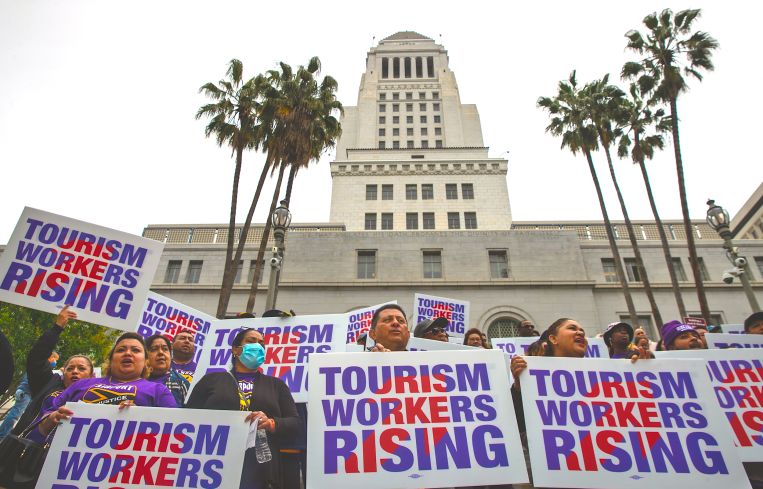SoCal Hotel Workers Could Strike Over Lack of Housing Affordability
Union leaders want to vote before contracts expire June 30.
By Greg Cornfield May 31, 2023 5:15 pm
reprints
While the return to office work has sputtered after the pandemic — and despite rising inflation — tourism in Southern California has boomed anew, bolstering much of the region’s economy. But trouble appears to be right around the corner for hotel landlords and operators.
Unite Here Local 11 — a union of 15,000 front desk clerks, housekeepers and hotel restaurant employees in Los Angeles and Orange counties — is gearing up to vote for a worker strike amid the peak tourism and travel season. Leaders are requesting wage increases to help workers afford housing after their initial proposal for an immediate $5 hourly raise was not met in April.
The union is asking its members to vote June 8 on a strike, ahead of the June 30 deadline when contracts are set to expire at 62 Southern California hotels, the L.A. Times reported. Those hotels include Westin Bonaventure in Downtown L.A., the Fairmont Miramar in Santa Monica, and the Beverly Wilshire in Beverly Hills, as well as Marriott, Hilton and Hyatt-branded hotels and resorts.
Union leaders said they want to make sure workers are fairly compensated ahead of the busy travel time, and so they can afford to live in L.A. before the city hosts the 2026 World Cup and the 2028 Olympics. Kurt Petersen, co-president of Unite Here Local 11, told the Times the union also plans to pressure other tourism companies, including food operators at airports, stadiums and resorts, whose contracts are also set to expire June 30, and affect more than 20,000 Southern California tourism workers.
Petersen said negotiations went silent after April. A Hyatt representative countered, and said the company started negotiations along with other hotels and is committed to bargaining in good faith.
Union members told the Times they can’t afford to live in L.A. on their current wages, and have to deal with long commutes from more affordable communities. They are also negotiating proposals related to health care, pensions and a policy against using E-Verify, a federal employment verification system used to check work eligibility, to protect undocumented workers.
Gregory Cornfield can be reached at gcornfield@commercialobserver.com.



